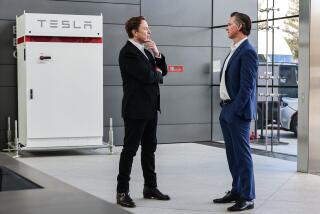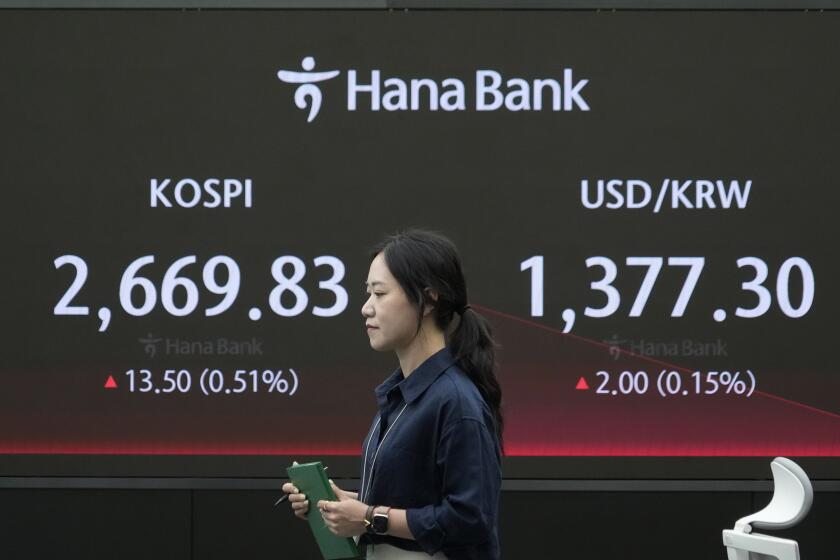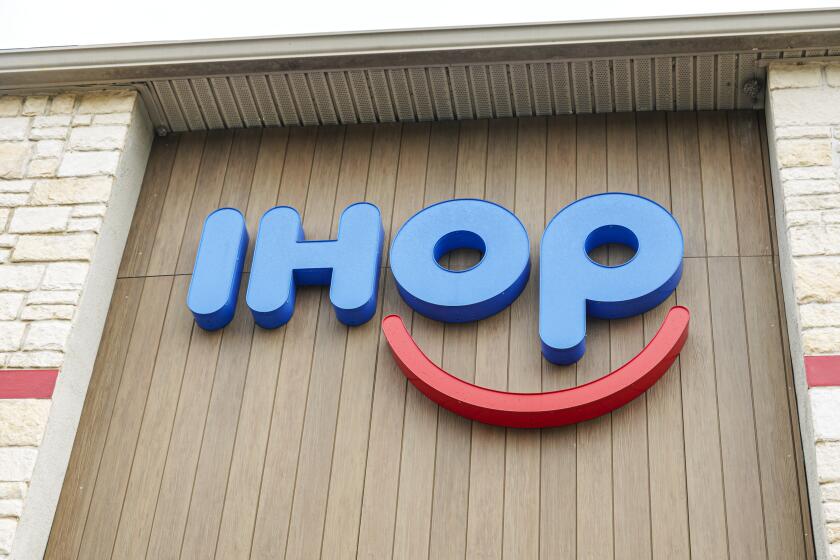Hollywood is giving tech start-ups the star treatment

Japanese technology entrepreneur Ken Fukazawa was in San Francisco in March when his geeky friends told him about something awesome coming up in Los Angeles.
Walt Disney Co. was opening its doors to selected start-ups for a summer of intensive mentoring. Fukazawa couldn’t think of anything better to help his company grow than the brand that he had fallen in love with as a child. His three-person company, Tyffon, moved into Disney offices in June, ready to improve a suite of apps that add spooky animations to photos.
Funding, ideas and workers are flowing into the Southland at record levels as thousands of entrepreneurs across a broad range of industries leverage the Internet to reshape how people shop, chat, watch and play.
But over the last three years, Hollywood’s embrace of start-ups such as Tyffon has become the most powerful magnet attracting technology entrepreneurs to set up in the Southland. In fact, Southern California is now the nation’s fastest-growing hub for start-ups. The entertainment industry, with its mad rush into digital distribution and its reservoirs of cash, creative talent and glamour, is the key driver.
Netflix Inc., Pandora Media Inc., Amazon.com Inc., Google Inc. and others upended how content-makers do business, and now entertainment industry leaders are turning to start-ups to help them ride the waves of change.
“Anyone in a traditional business is getting a wake-up call,” said Michael Yanover, head of business development at talent manager Creative Artists Agency. “You better lean in to the latest technology trend or you’re going to be dead in the water.”
The tension in Hollywood is driving demand, showering money and fostering confidence in Silicon Beach and other geographical start-up centers in the region.
After the crash course at Disney, Fukazawa can no longer imagine moving Tyffon back to Tokyo. Los Angeles’ balance of highly skilled programmers and content creators is perfect for Tyffon, which has seen 30 million downloads of its apps in two years.
“Gaming, entertainment, film, agencies — it’s all here,” said Fukazawa, who received advice from Disney Chief Executive Bob Iger and other top brass. “It’s best for us to do business here.”
Companies focused on online video, virtual reality, crowdfunding, gaming and online marketing or shopping are among those finding Los Angeles attractive because of the access to entertainment, advertising and fashion expertise.
Southern California saw the fastest rate of start-up creation of any major U.S. region in the first half of 2014, according to data collected from AngelList by Upfront Ventures, the region’s most active venture capital firm with more than $100 million invested in the last three years.
Combined, Los Angeles and Orange counties are on pace this year to receive $2.15 billion — their most since 2001, according to the National Venture Capital Assn.
Venture capitalists in Los Angeles give their better-funded counterparts in Silicon Valley credit for the recent growth. More than $500 million has flowed to Los Angeles from Silicon Valley investors in the last 2 1/2 years, according to Thomson Reuters data provided by the association.
“There was a tremendous amount of arrogance in Silicon Valley because L.A. was a lot of talk and maybe not a lot of walk, but there’s been some real successes lately,” said Brent Weinstein, who manages United Talent Agency’s start-up investment arm.
Content-sharing app Snapchat, for example, has received hundreds of millions of dollars in investment from Silicon Valley hotshots on its way to a reported worth of $10 billion. Auto-shopping website TrueCar Inc. had a $70-million initial public offering in May, and its stock has doubled since. Overall, the median value of a Los Angeles start-up’s acquisition or IPO has reached a post-recession record of $87 million so far in 2014 and topped the $75-million San Francisco Bay Area median, according to tracking firm PitchBook.
Speaking at Rand Corp. this month, Snapchat Chief Executive Evan Spiegel pointed to three Los Angeles advantages: Most hires are new to Los Angeles, so employees exploring the city together creates culture. Distance from Silicon Valley gives Snapchat a different point of view that he said was “important.” Being in the center of arts and entertainment surrounds Snapchat with “energy,” he said.
Google Executive Chairman Eric Schmidt told The Times recently that it’s hard to predict how big Southland tech will become, but that there’s reason for optimism with companies like Snapchat and Space Exploration Technologies Corp. building global brands.
“If you look at the benefit of Caltech and USC and UCLA and the quality of the programs they have, they are producing the people that are needed to produce the local winners,” Schmidt said.
The data-driven and stock-rich Silicon Valley has begun to fuse with Southern California’s content-fueled, cash-hungry culture to build a brand for tech in Los Angeles.
Hollywood’s interest in experimenting has led Northern California companies such as Netflix, YouTube, Facebook Inc. and Twitter Inc. to build larger presences in Los Angeles County. And an untold number of app makers are following suit, finding it essential to be close to the content makers who could be crucial in making their products popular.
The endorsement of technology start-ups has flowed deep into the entertainment industry. Shows such as NBC’s “The Blacklist” and ABC’s “Modern Family” now use a mobile app called Sync OnSet to store photos of props, costumes and sets that production managers had once stashed into three-ring binders. As its customer base grew to more than 100 productions, Wymsee Inc. moved some of its staff from Boston to the WeWork shared workspace in Hollywood because this remains “home base for entertainment,” co-founder Alex LoVerde said.
A few years ago, a Wymsee or Tyffon would have found itself stonewalled in Hollywood. Kevin Yorn, an entertainment attorney whose clients include Ellen DeGeneres and Matthew McConaughey, remembers his firm holding a 2007 gathering of about 40 celebrities, media executives, Silicon Valley venture capitalists and technologists.
Marc Andreessen, a deep-pocketed investor from the Silicon Valley, declared that Hollywood had to shape up and give in to what upstarts wanted, Yorn recalled. Miffed, the entertainment industry sat back until its peers in technology realized “people in Hollywood have secret ingredients — storytelling and large social bases — that can help propel a start-up,” Yorn said.
Transportation service Uber probably would have ridden to success without ferrying celebrities to red-carpet events. And someone other than Jessica Alba may have been able to start lifestyle and cleaning products brand Honest Co. and turn it into a near-$1-billion company. But the stars elevated the brands in the minds of consumers and the media and accelerated their progress, according to investors.
It’s also possible that if Honest Co. were to go public, it could raise Alba’s net worth more than any movie has. The economics of tech have become “real,” Yorn said. Entertainers who once spurned offers to advise or advertise start-ups are now pleading with managers to let them become investors or launch their own.
One of Yorn’s clients, “CSI” creator Anthony Zuiker, has worked with several companies experimenting with new ways to distribute content. Zuiker’s latest project is with Fanlala, a children-focused media start-up in Santa Monica. Zuiker, who invested in Fanlala, plans to use the website soon to launch a show that children will be able to interact with like a video game.
“We need to push very safe Hollywood into the gutsy tech space,” Zuiker said. “We see the beginnings, and it’s very exciting.”
Economists and investors point out that start-ups in Los Angeles aren’t just taking on entertainment-related businesses. Aerospace, finance and health are also popular. Likewise, the new technology investors from Los Angeles’ most well-known industry say their connections go beyond the stars to major companies, politicians and international audiences.
For CAA, the daily debates on which entrepreneurs deserve the money and guidance that could lift them into stardom are just a reflection of the zeitgeist.
“Everything we do in this company is about pop culture,” Yanover said. “Where is our pop culture going right now? Tech entrepreneurs.”
That thinking is increasingly shared by talent agencies William Morris Endeavor, ICM Partners and United Talent Agency, which are making similar bets on start-ups, as are studios Warner Bros. and, of course, Disney.
Last month, Tyffon and nine other start-ups invited to the Disney summer program offered polished presentations to a theater full of venture capitalists and dignitaries. Iger, the Disney CEO, sat in the front row as Fukazawa made his pitch about turning the animation of selfie photographs into a big business.
Learning about innovations that Disney lacked resources to develop in-house was energizing, said Jimmy Pitaro, president of Disney Interactive.
“There’s so many super-talented entrepreneurs and fantastic products, and to be able to get in on the ground floor with these people and businesses was a fantastic opportunity,” he said. “And I look forward to partnering with these guys.”
Twitter: @peard33
Times staff writer Russ Mitchell contributed to this report.
The new blockbusters
A look at some of the many Southland start-ups drawing attention from the entertainment industry or Silicon Valley.
Snapchat
Friends and advertisers use this app to send short, self-destructing multimedia messages. A popular new feature: highlight videos, rivaling the quality and viewership of something on the news, that the company produces using messages shared publicly from big events.
Tinder
Millennials briskly swipe through photos of their peers nearby to find dates and friends using this “hookup” app. Users will soon be able to match up with people anywhere in the world, for a fee.
Whisper
The worldwide anonymous message board app lets people vent, inspire and mingle. Whisper’s appropriation of user content to create “news” stories — like “12 things waiters do secretly” — has raised privacy concerns.
Honest Co.
The seller of baby and household goods free of toxic chemicals is the brainchild of actress Jessica Alba, who’s planning to add more products and develop storefronts that families could use as a hangout spot.
Scopely
The mobile game developer has a handful of hits — “Dice Buddies” and “Disco Bees” among them — and announced this month that it had raised $35 million, in part from Hollywood executives, that could provide stability in what has been a fickle industry.
Daqri
The company’s technology can turn a Crayola drawing into a 3-D creation through mobile apps, but its latest endeavor is “smart” helmets with a screen to be used, for example, by a building contractor to see virtual schematics of a job site.
Kin Community
The video network assists online stars in creating, distributing and making money from their content. Most of its audience is women aged 18 to 54. Entertainment giants have acquired similar companies for millions of dollars.







